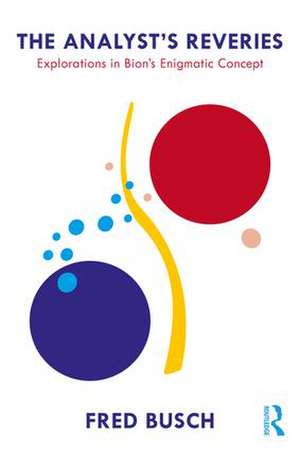The Analyst's Reveries: Explorations in Bion's Enigmatic Concept
Autor Fred Buschen Limba Engleză Paperback – mar 2019
After searching for the roots of the analyst’s use of reverie in Bion’s work and questioning whether in this regard Bion was a Bionian, Busch carefully examines the work of some post-Bionians and finds both convincing ways to think about the usefulness and limitations of the analyst’s use of reverie. He explores questions including:
- From what part of the mind does a reverie emerge?
- How does its provenance inform its transformative possibilities?
- Do we over-generalize in conceptualizing what is unrepresented, with the corresponding problem of false positives?
- Do dreams equal understanding and what about the generalizability of the co-created reverie?
The Analyst's Reveries will be of great interest to psychoanalysts and psychoanalytic psychotherapists.
| Toate formatele și edițiile | Preț | Express |
|---|---|---|
| Paperback (1) | 327.62 lei 6-8 săpt. | |
| Taylor & Francis – mar 2019 | 327.62 lei 6-8 săpt. | |
| Hardback (1) | 1095.75 lei 6-8 săpt. | |
| Taylor & Francis – 28 feb 2019 | 1095.75 lei 6-8 săpt. |
Preț: 327.62 lei
Preț vechi: 344.86 lei
-5% Nou
Puncte Express: 491
Preț estimativ în valută:
62.69€ • 65.63$ • 51.87£
62.69€ • 65.63$ • 51.87£
Carte tipărită la comandă
Livrare economică 05-19 aprilie
Preluare comenzi: 021 569.72.76
Specificații
ISBN-13: 9780367134174
ISBN-10: 0367134179
Pagini: 114
Dimensiuni: 156 x 234 x 10 mm
Greutate: 0.19 kg
Ediția:1
Editura: Taylor & Francis
Colecția Routledge
Locul publicării:Oxford, United Kingdom
ISBN-10: 0367134179
Pagini: 114
Dimensiuni: 156 x 234 x 10 mm
Greutate: 0.19 kg
Ediția:1
Editura: Taylor & Francis
Colecția Routledge
Locul publicării:Oxford, United Kingdom
Public țintă
Postgraduate and ProfessionalCuprins
1 The Beginning 2 Three Definitions 3 Bion’s Definition of Reverie: A Brief Review 4 Was Bion a Bionian? 5 Three Post-Bionians 6. Further Conceptual Problems in the Use of Reverie 7 Questions About Reverie as Co-Constructed 8 Conceptualizing an Enigma
Notă biografică
Fred Busch is a Training and Supervising Analyst at the Boston Psychoanalytic Society and Institute, USA. He is the author of Creating a Psychoanalytic Mind (Routledge, 2013).
Recenzii
"This is a seminal book that should become a must-read at Psychoanalytic Institutes across the globe for those who consider reverie to be a central concept in contemporary psychoanalysis. The concept of reverie is complex and hard to grasp, but Fred Busch is a clear and didactic writer and his cross-cultural knowledge of diverse psychoanalytic traditions make him a truly international scholar and an ideal surveyor of modern approaches to reverie."-Elias M da Rocha Barros, São Paulo Psychoanalytical Society and fellow of the British Psychoanalytical Society
"What happens when a psychoanalyst from one theoretical perspective is trying to immerse himself and discuss a concept from another tradition? Does this work? Can it be constructive?"Fred Busch wonders about this, and I think his new book is the perfect answer: a masterly combination of scientific curiosity, sharp investigation of the many versions and nuances of a concept, respectful but open and frank confrontation with other’s ideas and capacity for suspension during his journey through a multifaceted and still partially unclear area. Isn’t this what we mean as an authentic psychoanalytic attitude? A great book, both for its contents and its method."-Stefano Bolognini, IPA Past-President
"In this rich and provocative new book, Fred Busch, one of the most influential and creative writers in psychoanalysis today, once again demonstrates his discerning mind, modesty of style, and refreshing ability to communicate across psychoanalytic schools and cultures with considerable depth and scholarly insight. In addressing the heretofore perplexing topic of the analyst’s reveries, Busch deconstructs easily reified yet essential terms such as representation and reverie, while providing a level of clarity that serves to bridge gaps across theoretical schools. Moreover, throughout this engaging text, Busch maintains a conceptual consistency directly tied to clinical praxis."-Michael J. Diamond, Ph.D., Training and Supervising Analyst, Los Angeles Institute and Society for Psychoanalytic Studies; author of The Second Century of Psychoanalysis: Evolving Perspectives on Therapeutic Action
"What happens when a psychoanalyst from one theoretical perspective is trying to immerse himself and discuss a concept from another tradition? Does this work? Can it be constructive?"Fred Busch wonders about this, and I think his new book is the perfect answer: a masterly combination of scientific curiosity, sharp investigation of the many versions and nuances of a concept, respectful but open and frank confrontation with other’s ideas and capacity for suspension during his journey through a multifaceted and still partially unclear area. Isn’t this what we mean as an authentic psychoanalytic attitude? A great book, both for its contents and its method."-Stefano Bolognini, IPA Past-President
"In this rich and provocative new book, Fred Busch, one of the most influential and creative writers in psychoanalysis today, once again demonstrates his discerning mind, modesty of style, and refreshing ability to communicate across psychoanalytic schools and cultures with considerable depth and scholarly insight. In addressing the heretofore perplexing topic of the analyst’s reveries, Busch deconstructs easily reified yet essential terms such as representation and reverie, while providing a level of clarity that serves to bridge gaps across theoretical schools. Moreover, throughout this engaging text, Busch maintains a conceptual consistency directly tied to clinical praxis."-Michael J. Diamond, Ph.D., Training and Supervising Analyst, Los Angeles Institute and Society for Psychoanalytic Studies; author of The Second Century of Psychoanalysis: Evolving Perspectives on Therapeutic Action
Descriere
The Analyst's Reveries finds increasing veneration for the analyst’s use of their reveries, while revealing important differences amongst post-Bionians in how reverie is defined and used clinically. Fred Busch ponders if it has been fully recognized that some post-Bionions suggest a new, radical paradigm for what is curative in psychoanalysis.
